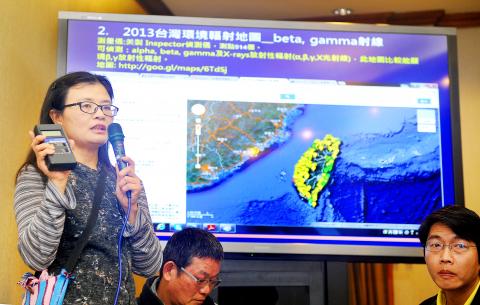Environmentalists yesterday said 54 locations around the nation had radiation levels more than three times the permitted maximums and said the high levels in the study may have been caused by poor nuclear waste treatment.
Starting in March last year, documentary maker Lin Jui-chu (林瑞珠) gathered more than 50 volunteers to survey Taiwan’s radiation levels.
The volunteers used handheld digital radiation detectors to measure ionizing radiation at 733 sites and 1,959 detection spots across the nation. They made an effort to record data at elementary schools, parks, beaches and other frequented areas.

Photo: Liao Chen-huei, Taipei Times
Lin said she was inspired by a report produced by Tokyo-based Taiwanese writer and anti-nuclear advocate Liu Li-erh (劉黎兒) about her discovery that the radiation levels in many parts of Taipei were higher than some recorded in Tokyo after the Fukushima Dai-ichi nuclear accident in 2011.
Hsinchu Environmental Protection Association chairperson Chung Shu-chi (鍾淑姬) said: “Up to the end of last year, our survey results showed that the radiation levels detected at 54 of 44 sites were above 0.3 microsieverts per hour — about three times the allowable standard in Taiwan.”
Their data showed the highest radiation levels of 1.92 microsieverts, 1.42 microsieverts and 0.928 microsieverts, were all detected at National Tsing Hua University.
Green Formosa Front standing director Lin Chang-mao (林長茂) said that because radiation exposure may cause the most harm to organs in adults — especially women’s reproductive organs — and children’s heads, they conducted their measurements at 1m above ground level.
Lin said they had doubts about the 24-hour radiation levels reported by the Atomic Energy Council’s 45 monitoring stations across the nation because the council’s detection equipment is enclosed in steel boxes, and the levels detected at Lanyu (蘭嶼) — where a temporary nuclear waste storage facility is located — were often the lowest among all the stations.
The volunteer group said they suspected the average radiation levels detected across the nation were the result of poor nuclear waste treatment, especially at Taiwan Power Co’s volume reduction center for compressing and incinerating low-level radioactive waste.
Nuclear expert He Li-wei (賀立維), an Yilan Charlie Chen Foundation consultant, said based on the law of conservation of mass, the decontamination of radioactive substances does not completely destroy the radiation, so burning nuclear waste may cause radiation to spread into the air and water.
They urged the council to explain how it will deal with the radiation levels.
In response, the council said the detected levels may have been affected by background radiation levels or improper use of the detectors and that it was willing to conduct a survey along with the civic groups to clarify the measurements.

‘DENIAL DEFENSE’: The US would increase its military presence with uncrewed ships, and submarines, while boosting defense in the Indo-Pacific, a Pete Hegseth memo said The US is reorienting its military strategy to focus primarily on deterring a potential Chinese invasion of Taiwan, a memo signed by US Secretary of Defense Pete Hegseth showed. The memo also called on Taiwan to increase its defense spending. The document, known as the “Interim National Defense Strategic Guidance,” was distributed this month and detailed the national defense plans of US President Donald Trump’s administration, an article in the Washington Post said on Saturday. It outlines how the US can prepare for a potential war with China and defend itself from threats in the “near abroad,” including Greenland and the Panama

A wild live dugong was found in Taiwan for the first time in 88 years, after it was accidentally caught by a fisher’s net on Tuesday in Yilan County’s Fenniaolin (粉鳥林). This is the first sighting of the species in Taiwan since 1937, having already been considered “extinct” in the country and considered as “vulnerable” by the International Union for Conservation of Nature. A fisher surnamed Chen (陳) went to Fenniaolin to collect the fish in his netting, but instead caught a 3m long, 500kg dugong. The fisher released the animal back into the wild, not realizing it was an endangered species at

The Chinese Nationalist Party (KMT) is maintaining close ties with Beijing, the Democratic Progressive Party (DPP) said yesterday, hours after a new round of Chinese military drills in the Taiwan Strait began. Political parties in a democracy have a responsibility to be loyal to the nation and defend its sovereignty, DPP spokesman Justin Wu (吳崢) told a news conference in Taipei. His comments came hours after Beijing announced via Chinese state media that the Chinese People’s Liberation Army’s Eastern Theater Command was holding large-scale drills simulating a multi-pronged attack on Taiwan. Contrary to the KMT’s claims that it is staunchly anti-communist, KMT Deputy

The High Prosecutors’ Office yesterday withdrew an appeal against the acquittal of a former bank manager 22 years after his death, marking Taiwan’s first instance of prosecutors rendering posthumous justice to a wrongfully convicted defendant. Chu Ching-en (諸慶恩) — formerly a manager at the Taipei branch of BNP Paribas — was in 1999 accused by Weng Mao-chung (翁茂鍾), then-president of Chia Her Industrial Co, of forging a request for a fixed deposit of US$10 million by I-Hwa Industrial Co, a subsidiary of Chia Her, which was used as collateral. Chu was ruled not guilty in the first trial, but was found guilty